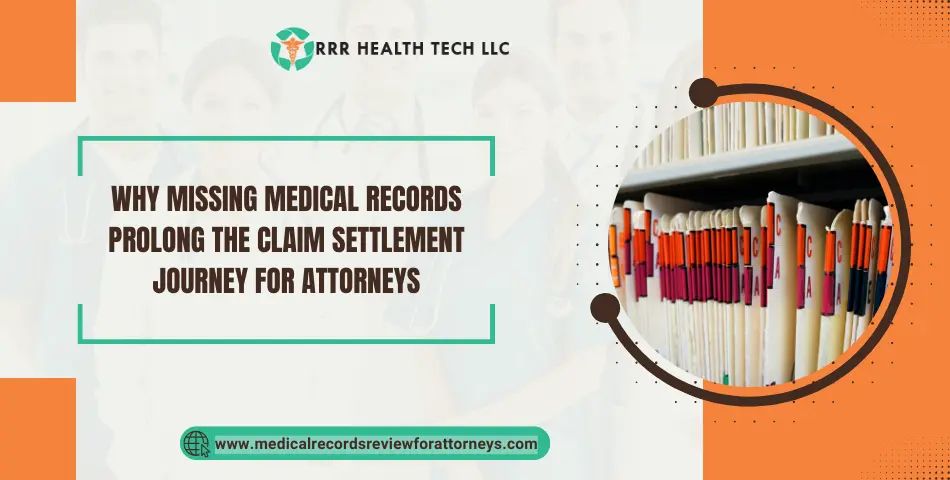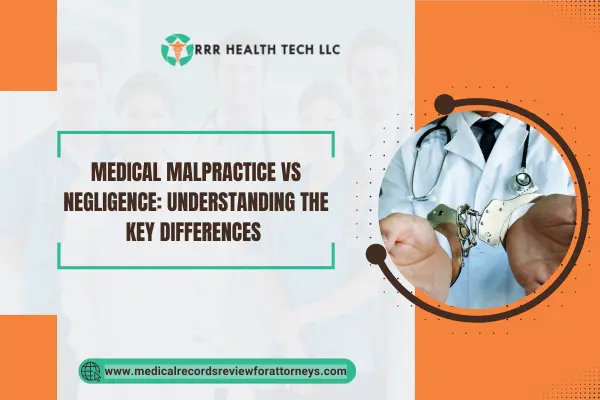
It makes sense that claim settlement guidance often carries delays because medical records tend to go missing along with several claims. For attorneys focusing on personal injury, workers’ compensation, or medical malpractice, absent medical records become a hindrance. This blog discusses why the absence of medical records prolongs claim settlements and proposes measures to improve their efficiency.
The Role of Medical Records in Claim Settlements
Medical records are to be understood as the documents that are the essence of any injury cases, and malpractice cases as they are proofs that injury occurred, what type of injury occurred, and what time injuries occurred.
Why Are Medical Records Crucial for Attorneys?
Medical records:
- Validate Claims: Show the extent and reasons for injuries sustained.
- Support Demand Letters: Helps lawyers to make correct demands about payment.
- Strengthen Negotiations: Claims have enough proof to enable negotiations with insurance companies.
Missing Records: A Recipe for Delayed Justice
Where medical records are incomplete and even where some records are not available or are entirely missing, cases turn out to be:
- Missing files altogether e.g. attorney’s files chronic links.
- Low evidence volume issued by the insurance adjusters therefore payouts are delayed.
- Full court hearings become stalled in the court owing to the unsatisfactorily completed medical timeline.
Common Reasons for Missing Medical Records
Determining why in the first-place records end up being absent lets the attorneys try to take remedial measures in advance.
Causes of Missing Medical Records
- Provider Non-Compliance: In certain instances, those providing care ignore requests to obtain records or simply do not feel like providing any.
- Fragmented Medical History: In most scenarios, patients must visit more than one doctor which makes their records to be disorganized.
- Data Mismanagement: Great records are supposed to be kept in files but failure to do so means that some of the files would be lost.
- HIPAA Restrictions: There are legal restrictions on choices that might delay record access.
The Impact on Settlement Timelines
- Extended Discovery Phase: On occasion, attorneys take longer than necessary to put together records and this extends the discovery phase.
- Reduced Negotiation Power: There is the absence of documents and for that reason demand letters are weak.
- Prolonged Client Stress: A wait of longer compensation time is what clients expect.
Strategies for Attorneys to Handle Missing Records
With a systemic model, Attorneys can avoid or minimize the chances of any delays.
Proactive Steps to Address Missing Medical Records
- Early Identification:
- Make it a goal to retrieve all the medical histories at the beginning of the hearing.
- Patient intake forms should consist of the providers, and they should be carefully looked at to ensure all providers are in.
- Follow-Up Mechanisms:
- Recovery letters and calls should be used to help make requests quicker.
- For uncooperative providers, subpoena power should be sought.
- Leverage Technology:
- For slow medical Records, the use of electronic medical record EMR should be looked at.
- Medical Record Review Service providers would easily assist with the records needed.
The Role of Expert Medical Record Review Services
- Comprehensive Summaries: All details are catered and accounted for which helps explain why experts resolve such issues.
- Chronologies and Timelines: They prepare better-working documents to be used in any disciplinary case as well.
- Error Identification: Gaps in the records that require attention are noted by the reviewers.
Benefits of Complete Medical Records in Claim Settlements
Having all records makes the entire process of claiming compensation to be simpler.
How Complete Medical Records Expedite Settlements
- Stronger Evidence: Ensuring that the documents are precisely outlining everything goes a long way in winning cases.
- Faster Negotiations: The likelihood of an agreement being reached by one or more insurance adjusters quickly is enhanced.
- Reduced Litigation Costs: The expenditure involved in the legal battle tends to be limited as the evidence at hand is sufficient in most situations.
Case Study: Impact of Missing vs. Complete Records
Scenario 1: Relevant ER records were missing in a personal injury case and as a result, the parties could not get into negotiations for six months
Scenario 2: On the other hand, for one such instance where medical chronologies were complete the matter was resolved in two months.
Conclusion
A very common factor amongst struggles of attorneys during claim settlement is missing medical records. Looking at the issue from its origin to its ramifications and finally to its cure, one can, no doubt, from saying, enhance the service offered to their clients in terms of reducing delays.
Frequently Asked Questions
How can attorneys quickly identify missing medical records?
Multi-sourcing patient intake forms against already held records gives an even time frame asking providers for a time about when the patients were seen. Expert medical record review services can also point out missing records.
What are the risks of proceeding with incomplete medical records?
Completing it with incomplete records would create a weaker case would cover less, and there would be improbable or undesired settlements reaching to place
Struggling with missing medical records in your cases? Partner with RRR Health Tech LLC for expert medical record review and analysis.


